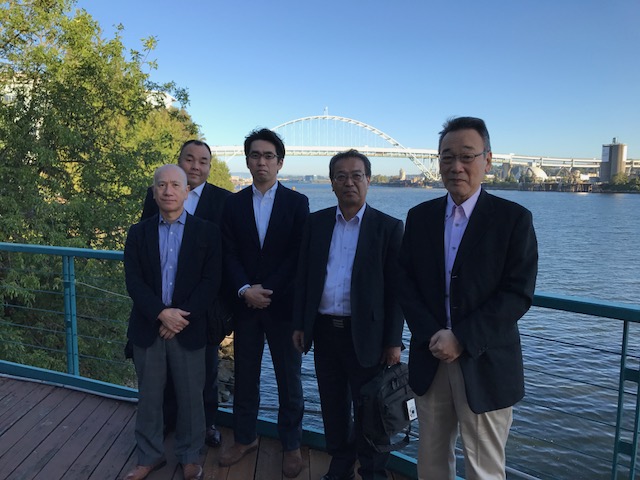First Japanese Baking Industry Trade Team Visits United States
As consumer demand for higher quality food strengthens around the world, so do the expectations of everyone from those who grow the food to those who prepare it. Japan is one of those markets, with end-use companies demanding very high standards for a wide range of flour products used for hundreds of different food products. To build an understanding of how U.S. wheat compares to other wheat suppliers, USW invited four executives from the four major Japanese baking companies to the United States, Aug. 29 to Sep. 2, 2017. The participants are all members of the Japan Baking Industry Association and were led by USW Country Director Wataru Utsunomiya, from the USW Tokyo Office.
USW collaborated with the North Dakota Wheat Commission (NDWC) to organize and host this group, the first USW-hosted Japanese baking industry trade delegation to visit the United States. Funding also came from the USDA Foreign Agricultural Service (FAS).
“Japan is a sophisticated market purchasing more U.S. wheat than any other country, including more than 3.0 million metric tons on average annually over the past five years,” said Shawn Campbell, USW Deputy Director of the West Coast Office. “USW’s ongoing efforts in Japan focus on providing up-to-date market information and collaborating with Japanese industry groups. This has built trust and helped foster a mutually beneficial, long-term trading relationship.”
The delegation began its trip in North Dakota with a visit to the NDWC office for a discussion on the 2017 hard red spring (HRS) production prospect and price outlook. The group also visited the Northern Crops Institute (NCI) and learned about the education opportunities it provides.
According to NDWC Marketing Specialist Erica Olson, the discussions on wheat breeding with staff of the North Dakota State University (NDSU) Spring Wheat Breeding Program and Wheat Quality Lab were eye-opening for all.
“The majority of our visitors are millers and procurement staff, so this team was unique and knew less about the wheat breeding process and supply chain,” said Olson. “Quality is still the key factor in flour, so as they shared their consumer trends and demands, we were able to tie that back to how U.S. wheat quality affects trends, and ultimately starts with wheat breeding and research programs.”
The group also toured the North Dakota State Mill and enjoyed discussion with farmer commissioners and NDWC staff.
“Our farmers enjoyed their conversations with this team and the opportunity to learn about the different products made with U.S. wheat that are popular in the Japanese market,” said Olson.
Next, the participants traveled to Oregon, where they visited the USW West Coast Office, Wheat Marketing Center (WMC) and met with a Federal Grain Inspection Service (FGIS) quality assurance specialist. They also visited Columbia Export Terminal for a tour.
Participants said they weren’t aware of the scope of the U.S. wheat industry and the intricate details of the process to produce high quality wheat before this trip.
“U.S. wheat farmers are interested in learning more about what happens to their wheat after it leaves the port. These bakers have the same interest in learning about the wheat before it arrives to them as flour,” said Campbell. “Now they have a better understanding of how U.S. wheat quality is sustained over time, the process to improve it and how it affects their markets in Japan.”
USW’s mission is to “develop, maintain, and expand international markets to enhance wheat’s profitability for U.S. wheat producers and its value for their customers.” USW activities in more than 100 countries are made possible through producer checkoff dollars managed by 17 state wheat commissions and cost-share funding provided by USDA’s Foreign Agricultural Service. For more information, visit our website at www.uswheat.org.
# # #
Nondiscrimination and Alternate Means of Communications
U.S. Wheat Associates prohibits discrimination in all its programs and activities on the basis of race, color, religion, national origin, gender, marital or family status, age, disability, political beliefs or sexual orientation. Persons with disabilities who require alternative means for communication of program information (Braille, large print, audiotape, etc.) should contact U.S. Wheat Associates at 202-463-0999 (TDD/TTY – 800-877-8339, or from outside the U.S.- 605-331-4923). To file a complaint of discrimination, write to Vice President of Finance, U.S. Wheat Associates, 3103 10th Street, North, Arlington, VA 22201, or call 202-463-0999. U.S. Wheat Associates is an equal opportunity provider and employer.


